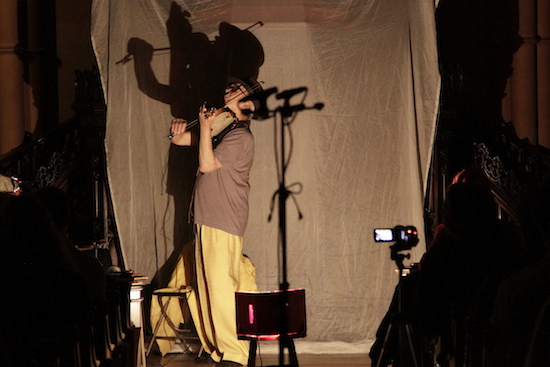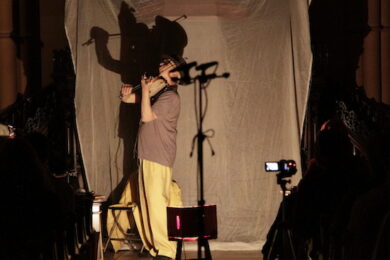Photo by Bradley Buehring; courtesy ISSUE Project Room
Between the murderous, vehemently techno-political associations the word has come to evoke in recent years, and the increasingly short attention spans of audiences accustomed to both visual and auditory spectacle, this isn’t a great time to be a drone.
Not that drone music was ever platinum fodder for mass consumption, obviously; but with a growing expectation that set-up, development, and pay-off be squeezed into a 140-character tweet or a 6-second Vine, it’s a wonder that long-form improvisation with sustained tones still has any audience at all. Both drone and improv are simple-seeming musical concepts that in fact require great proficiency to be well-executed; "improvised drone" is a doubly demanding practice that asks as much of the audience as it does of the performers. Fortunately, the audience that fills Brooklyn’s First Unitarian Congregation on the evening of March 5th is as eager as the performers are proficient. These are, after all, not just any improvisers: the hushed expectation and full pews in the neo-Gothic church attest adequately to the legendary status both Tony Conrad and Charlemagne Palestine share in the world of experimental performance and long-form improvisation. The show is part of the consistently excellent programming by Issue Project Room, a Brooklyn based non-profit organisation.
Fairly short as these things go, clocking in at roughly 75 minutes, the performance leads its audience firmly by the hand, without ever faltering or showing dullness. It simmers elegantly and efficiently, sparking and flaring up for brief moments but never exploding. The evening was everything one might have expected from such august and experienced musicians: consistent, assured, effective, and beautiful, leavened with Conrad’s quirky humour and Palestine’s cultivated oddness.
Palestine is a famously ritualistic performer; the ribbons with which the room is festooned and the stuffed animals with which the grand piano is bedecked leave a striking and immediately identifiable first impression. The evening begins with the repetitive, not-quite rhythmic sound of Palestine clinking two wine glasses together repeatedly while sitting at the piano, though with performances of this nature, it’s hard to say where its limits rest exactly. Palestine sits at the piano for at least 10 minutes before he starts clinking the glasses together. Does the show start when he appears in front of the crowd, or when he starts making sounds? When Conrad steps out in a roomy yellow suit, sits and wipes down the strings of his violin with a cloth, producing a not-unpleasant scraping sound, is he performing, or did an engineer just forget to turn him down? After a few minutes of clinking, Conrad begins to slowly draw his bow across the strings.
The first major shift in the performance comes as Palestine rises and walks up the stairs to the church’s massive pipe organ, creating a soft bedrock as Conrad begins to loop and multitrack his violin. Then Palestine returns to the piano, moderate, almost syncopated notes as he begins emitting his trademark vocals, a series of elongated, tremulous vowels. Later he again goes to the organ and its graceful pipes take center over denser, more insistent chords. Conrad leaves his violin and turns to what looks but certainly doesn’t sound like a pedal steel guitar, eliciting deep, thick tones from it with a bow, sometimes by pulling it across the strings and sometimes by striking them. Suddenly Palestine reappears on the floor, coming down the center aisle, chanting at Conrad with arms outstretched, briefly singing in the center of the stage before sitting at the piano a final time to engage more rapid and clustered notes this time. Finally, without any evident signal between them, they stop playing and let the violin and piano fade away, leaving only the pipe organ to softly hum in the air above the congregation.
The most remarkable thing about the show is its calm, centered grace. There is nothing haphazard about it, no stumbling, nothing that felt random, ill-timed or inappropriate. But neither does it feel rehearsed, tight, or overly deliberate. Both musicians move intuitively but consciously, with efficiency but seemingly no effort at all. Dissonance is kept to a minimum, but simple, self-evident harmonies are avoided, too. This is genuine collaboration, and the fact that they barely look at each other and at times are outside each other’s line of sight makes it feel like the beautiful and vibrant music is springing up of its own accord in the air between the two men.
There are no radical surprises. Notwithstanding the two puzzled-looking audience members who stand and leave about 20 minutes into the show, clutching their coats defensively, the audience seem fairly well-prepared, as might be expected in such a venue in this particular city. The musicians take the crowd with them effortlessly: people listen intently, but with a genuine pleasure rather than the worshipful determination to consciously appreciate that sometimes marks the audience’s concentration at such avant-garde instances. Palestine’s aura of ineffable weirdness is balanced out by Conrad’s wry grin and workmanlike body language, and a big part of the evening’s pleasure, for me, is seeing the assured ease with which the lustrous waves of music are evoked. Lacking in pretension and drama, it is an extended exercise in proficiency and atmosphere, perfectly situated among the Gothic arches and painted angels. And when, after 75 minutes or so the sound fades away, it seems somehow both a perfectly timed conclusion and an open end to something that could have continued for many more hours. But that’s exactly the power of a well-executed drone: to bend time, to alternately elongate and compress consciousness, to feel music in your body rather than counting beats in your head. After an extended standing ovation and a rambling appreciation from Conrad, we walk out into the relentless New York blizzard, and time reasserts itself.
<div class="fb-comments" data-href="http://thequietus.com/articles/17414-live-report-tony-conrad-and-charlemagne-palestine-review” data-width="550">



